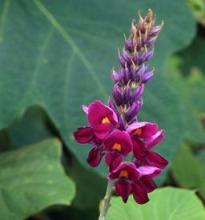 Kudzu root (pueraria lobata, radix puerariae) has been proven to reduce alcohol consumption in both humans and animals in placebo controlled, double blind studies published in peer reviewed scientific journals. As such, kudzu root offers hope to heavy drinkers who wish to make a reduction in their alcohol consumption.
Kudzu root (pueraria lobata, radix puerariae) has been proven to reduce alcohol consumption in both humans and animals in placebo controlled, double blind studies published in peer reviewed scientific journals. As such, kudzu root offers hope to heavy drinkers who wish to make a reduction in their alcohol consumption.
Lukas and his colleagues published a study of the use of kudzu root in humans in 2005. This was a placebo controlled double blind study where subjects served as their own controls. In the first round of the study half of the subjects were given placebo and half the kudzu root. In the second round of the study the condition was reversed--those who had received the kudzu got placebo, and those who had gotten placebo got kudzu. This allowed the researchers to view each subject under each condition and allowed them to rule out the order of treatment as a factor.
The result was that subjects receiving the kudzu drank significantly less than those receiving the placebo. Subjects receiving the kudzu drank an average of 532 ml of beer per session whereas subjects receiving the placebo drank an average of 906 ml of beer per session. This was a statistically significant difference with P = 0.031. The subjects reported no decrease in alcohol craving or urge to drink, however.
Studies have shown that kudzu root also leads to significantly reduced alcohol consumption in rats. The active compounds in kudzu root which lead to reduced drinking are called isoflavonids or isoflavones. Rat studies show that the reason that subjects consume less alcohol is that the isoflavonids found in kudzu root allow acetaldehyde to accumulate and this makes the alcohol less desirable.
Even though kudzu root appears to have a mechanism similar to antabuse (disulfiram) in that it allows acetaldehyde to accumulate in the body--kudzu root is a very gentle medication with none of the violent effects of antabuse. Subjects who drink alcohol after taking antabuse become violently ill and too much alcohol mixed with antabuse can be fatal. However, subjects who received kudzu root merely slowed their rate of drinking and consumed less total alcohol per drinking session than they did when receiving a placebo. None of the subjects taking kudzu complained of feeling physically ill.
Since kudzu root reduces the amount of alcohol consumed it may be effective as hangover prevention. However, kudzu root is not effective as a hangover cure when taken the morning after drinking. McGregor cautions that taking kudzu root the morning after may actually have long term negative medical effects. The traditional Chinese cure for hangover is kudzu flower (pueraria flos). Kudzu flower appears to help eliminate acetaldehyde in humans, but the effectiveness of kudzu flower as a hangover remedy has yet to be confirmed in a placebo controlled double blind study.
Always make certain that any kudzu root supplement you buy actually contains enough of the active ingredient to be effective. The Lukas study used 500-mg capsules of kudzu extract (NPI-031, Natural Pharmacia Int., Inc., Research Triangle Park, NC) containing sugar beet-based filler and 19% puerarin, 4% daidzin, and 2.0% daidzein. Participants in the Lukas study were instructed to take two 500-mg capsules three times daily.
REFERENCES:
Benlhabib E, Baker JI, Keyler DE, Singh AK. (2004). Effects of purified puerarin on voluntary alcohol intake and alcohol withdrawal symptoms in P rats receiving free access to water and alcohol. J Med Food. Summer;7(2):180-6.
http://www.ncbi.nlm.nih.gov/pubmed/15298765
Benlhabib E, Baker JI, Keyler DE, Singh AK (2004). Kudzu root extract suppresses voluntary alcohol intake and alcohol withdrawal symptoms in P rats receiving free access to water and alcohol. J Med Food. Summer;7(2):168-79.
http://www.ncbi.nlm.nih.gov/pubmed/15298764
Lin RC, Guthrie S, Xie CY, Mai K, Lee DY, Lumeng L, Li TK. (1996). Isoflavonoid compounds extracted from Pueraria lobata suppress alcohol preference in a pharmacogenetic rat model of alcoholism. Alcohol Clin Exp Res. Jun;20(4):659-63.
http://www.ncbi.nlm.nih.gov/pubmed/8800381
Lin RC, Li TK. (1998). Effects of isoflavones on alcohol pharmacokinetics and alcohol-drinking behavior in rats. Am J Clin Nutr. Dec;68(6 Suppl):1512S-1515S.
http://www.ncbi.nlm.nih.gov/pubmed/9848526
http://ajcn.nutrition.org/content/68/6/1512S.full.pdf
Lowe ED, Gao GY, Johnson LN, Keung WM. (2008). Structure of daidzin, a naturally occurring anti-alcohol-addiction agent, in complex with human mitochondrial aldehyde dehydrogenase. J Med Chem. Aug 14;51(15):4482-7.
http://www.ncbi.nlm.nih.gov/pubmed/18613661
Lukas SE, Penetar D, Berko J, Vicens L, Palmer C, Mallya G, Macklin EA, Lee DY. (2005). An extract of the Chinese herbal root kudzu reduces alcohol drinking by heavy drinkers in a naturalistic setting. Alcohol Clin Exp Res. May;29(5):756-62.
http://www.ncbi.nlm.nih.gov/pubmed/15897719
McGregor NR. (2007). Pueraria lobata (Kudzu root) hangover remedies and acetaldehyde-associated neoplasm risk. Alcohol. Nov;41(7):469-78.
http://www.ncbi.nlm.nih.gov/pubmed/17980785
Singh AK, Jiang Y, Benlhabib E, Gupta S. (2007). Herbal mixtures consisting of puerarin and either polyenylphosphatidylcholine or curcumin provide comprehensive protection against alcohol-related disorders in P rats receiving free choice water and 15% ethanol in pure water. J Med Food. Sep;10(3):526-42.
http://www.ncbi.nlm.nih.gov/pubmed/17887948



